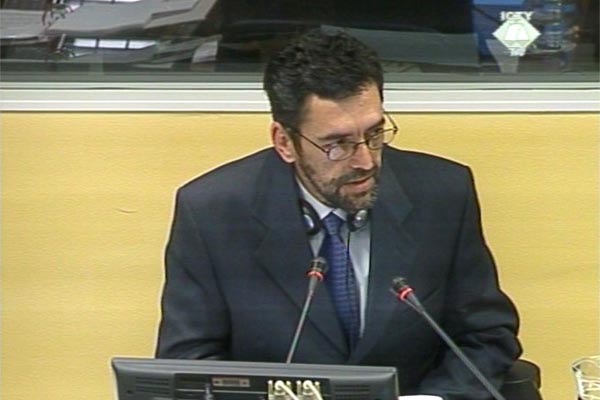Home
CRIME SCENE INVESTIGATION THWARTED BY DARKNESS
The investigating judge was told people had been killed in the village of Ljuboten, but he didn't go to the crime scene because of compromised security and darkness, says Petre Stojanovski
 Petre Stojanovski, defense witness for Ljubeta Boskoski
Petre Stojanovski, defense witness for Ljubeta Boskoski On 12 August 2001, Inspector Petre Stojanovski, testifying as Ljube Boskoski’s defence witness, was in constant touch with the police station in Cair. After the action launched by the Macedonian security forces, the villagers of Ljuboten were detained there. At that time, Stojanovski was assistant to the chief of the Internal Affairs Department in Skopje. It was also his task to liaise with the members of Ljube Boskoski's commission investigating the Ljuboten incident.
Contrary to the evidence of victims and prosecution witnesses – who claimed that the police detained civilians – Stojanovski said that, according to the information he received only 'terrorists' had been transferred to Cair. They took part in the fighting but then dropped their weapons and shed their uniforms in an attempt to leave Ljuboten together with the civilians, Stojanovski had been told.
Stojanovski's colleagues from the police stations in Cair and Mirkovci told him that people had been killed in Ljuboten, but because of the clashes 'nobody could get near the village'. According to Stojanovski, the investigating judge decided not to do the crime scene investigation because of security reasons. His decision was 'final’, the witness said, and there was no way the police could do anything to change it. The defense claims that the judicial bodies – and not the police – were in charge of the investigation of crimes committed in the village of Ljuboten.
Stojanovski noted that the investigative bodies had not been able to visit the crime scene because of darkness: night fell as they were waiting for the security situation in the village to improve on 13 August 2001. 'It was impossible to conduct a crime-scene investigation’, he clarified.
In his evidence, Stojanovski spoke of the way in which the Interior Ministry operated and Ljube Boskoski's defence counsel asked him if the police had in any way treated Albanians and Macedonians differently. According to Stojanovski, there were no ethnic considerations, because the police was bound 'by law and to the tax payers who came from all ethnic groups, not only Macedonian'.
The examination-in chief of Petre Stojanovski will be completed on Monday morning.
Linked Reports
- Case : Boskoski & Tarculovski
- 2008-02-01 SAVING REPUTATION OR FINDING THE TRUTH?
- 2008-01-31 RIGOROUS INVESTIGATION
- 2008-01-30 MINISTER BOSKOSKI’S TRANSPARENCY AND IMPARTIALITY
- 2008-03-03 GERMAN JOURNALIST IN A SKOPJE HOTEL
- 2008-03-04 DEFENSE: LJUBOTEN WAS A LEGITIMATE MILITARY TARGET
- 2008-03-10 INTERNAL CONFLICT, NOT ARMED CONFLICT
